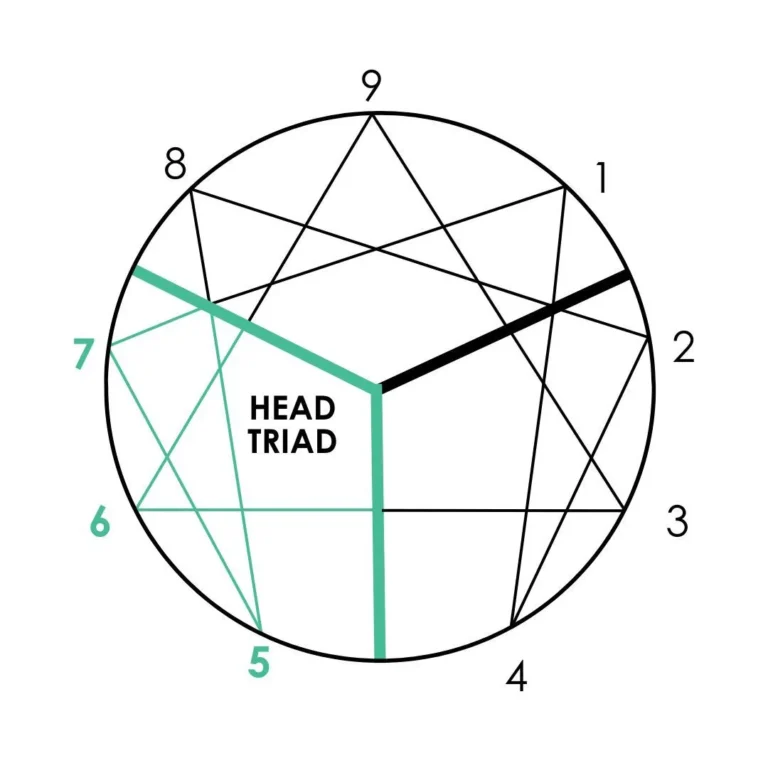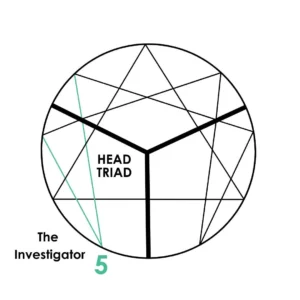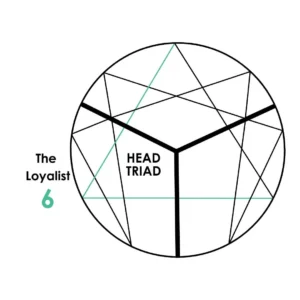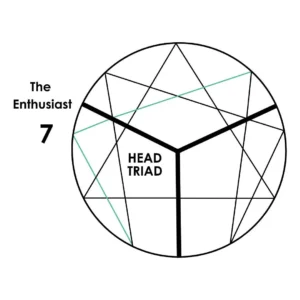Do you prize knowledge, logic, and reason over emotions? Do you feel most in your element when analyzing concepts and ideas? Do you make decisions based on objective facts rather than feelings? If so, you may be one of the Enneagram’s “head types.”
The Enneagram is a personality typing system that divides people into nine types based on their core motivations, fears, and desires. These nine types are further grouped into three triads – the head triad, the heart triad, and the body triad. Each triad contains three interconnected yet distinct personality types.
The “head” types – identified by their corresponding numbers 5, 6, and 7 – are characterized by their mental orientation. They seek knowledge, security, objectivity, and detachment from their emotions. People within this triad tend to have a thirst for understanding the world around them through analyzing facts and data.
Understanding what makes the Enneagram Head Types tick – and how to engage with both their healthy and unhealthy qualities – can help build stronger relationships with them. Let’s dive into the Head Types and uncover how to best relate to them.
The Enneagram – A Quick Primer
In our past articles, we’ve covered the basics of the Enneagram, a personality typing system that categorizes nine distinct personality types.
Each type is represented by a number, and its corresponding traits are organized hierarchically into three triads:
- Heart (Types 2, 3, 4)
- Gut (Types 8, 9, 1
- Head (Types 5, 6, 7)
While every person has a unique blend of all nine types, one type usually dominates. This “number” gives deeper insight into the motivations, fears, and general tendencies of a person. When an individual can understand why they act and think the way they do, it opens up a world of clarity and self-awareness.
What are the Enneagram Head Types?
The head triad lives up to its name – these types make decisions and process information through logic, reason, and intellectual analysis.
These types value competence, knowledge, rationality, and objectivity above all else. While they do experience emotions like anyone else, they prefer to keep them secondary to facts and critical thinking.
You can spot head types by their cerebral, analytical approach to problems. They enjoy theoretical discussions and have little patience for emotional exchanges or anything they deem irrational. They prize expertise and specialized knowledge, especially Type 5s – who have an insatiable need to accumulate information about their interests.
On the flip side, the head types may come across as overly detached, sometimes even cold. Their emphasis on objectivity can translate to dismissing or ignoring their own feelings and needs. They can also neglect the more personal, emotional concerns of others.
Overall, the head types share a core sense of purpose – the pursuit of truth through knowledge and logic.
The Enneagram Head Types
Type 5: The Investigator
Type 5s are motivated by knowledge and driven to understand the world through objective analysis. They seek mastery over concepts and will compulsively gather information about subjects that interest them.
Analytical, observant, and cerebral, Type 5s love spending time alone with their thoughts. They are often found learning and reading extensively to satisfy their need for expertise. Type 5s are independent and private, keeping their inner world under lock and key.
When healthy, Type 5s are brilliant theorists and researchers who contribute unique insights and knowledge. However, at average to unhealthy levels, the type’s withdrawn nature can cause them to become isolated and emotionally detached. At their worst, Type 5s may become nihilistic or corrupted by their endless pursuit of power and control.
Type 5s fear being useless, helpless, or incapable. They also have a deep-seated fear of lacking knowledge or resources. To defend against this fear, Type 5s withdraw and treasure their inner sanctuary of ideas. By becoming self-sufficient experts, Type 5s believe they can be prepared for any challenge that comes their way.
Type 6: The Loyalist
Type 6s are motivated by security and gaining support and guidance. They are the guardians of credibility, as they constantly evaluate the reliability of people and beliefs.
Practical, skeptical, and witty, Type 6s make loyal companions who bring a sense of duty and commitment to their relationships. They are community and family-oriented, excelling at collaboration and teamwork.
When healthy, Type 6s are incredibly dependable, trustworthy allies. They bring out the best in their friends and partners. However, at average to unhealthy levels, Type 6s may become paranoid, defensive, and overcompensating. At their worst, Type 6s project their fears onto the world around them and lash out against perceived threats.
Type 6s fear being without support or guidance. They are anxious about the unknown and the unpredictability of life. To defend against this, Type 6s look for structures, authorities, and beliefs to place their trust in. Reliable defenses like questioning, doubt, and humor also protect Type 6s from feared instability.
Type 7: The Enthusiast
Type 7s are motivated by variety, experience, and stimulation. They have a contagious zeal for life and spread excitement wherever they go.
Optimistic, adventurous, and energetic, Type 7s are constantly on the lookout for fun and new experiences. They prefer broad overviews and are gifted at generating new possibilities.
When healthy, Type 7s are exceptionally joyful and bring creativity and flair to everything they do. However, at average to unhealthy levels, Type 7s may become ungrounded, impulsive, and overly stimulated. At their worst, Type 7s become reckless addicts who compulsively chase stimulation to avoid pain.
Type 7s fear being trapped in emotional pain or missing out on rewarding experiences. In defense, they avoid focusing on negative emotions and painful memories. Type 7s would rather keep things upbeat and moving forward, which often means glossing over problems.
Exploring Subtypes and Instincts
While the core motivations of each type remain constant, subtypes and dominant instincts add nuance and variation to how the head types express themselves.
Subtypes indicate whether a type is influenced more by the traits of a neighboring type. For instance, Type 5w4s have a withdrawn, creative streak from the influence of Type 4.
Instincts describe if a type is more attuned to self-preservation, social interactions, or one-on-one relationships. An instinct acts as a “backup” instinct that shapes behavior.
Some examples:
- Type 5 SP/SX: A more grounded “scientist” who balances solitary research with a passion for their field of study.
- Type 6 SX/SP: Fiercely loyal to the inner circle while remaining wary of threats to security.
- Type 7 SO/SP: Friendly enthusiast who needs social stimulation but avoids overindulgence.
As we can see, subtypes and dominant instincts flavor each type’s core motivations and traits. A social 6 will still be loyal but express it more openly. A self-pres 5 will still be cerebral but more focused on practical skills.
Exploring subtypes and instincts provides a fuller picture of the rich diversity within each Enneagram type – showing just how much more there is to learn about the human experience.
I Think I’m a Head Type – Now What?
If you identify with the core motivations and traits of Types 5, 6, or 7, congratulations on recognizing your Enneagram head type. This self-awareness is the first step toward growth. Now comes the fun part – understanding your core drives, gifts, and potential stumbling blocks.
From there, you can begin several exercises designed to help you understand yourself better. Start by uncovering your dominant instinct – do you gravitate toward the safety of security? The thrill of mastery? Or the intimacy of connection?
Next, look into your subtype influences. Do they bring out more or less typical traits for your type? Learn about the four Wings and how yours affects your behavior. Finally, explore strategies for making the most of your strengths while minimizing weaknesses.
Here are some further insights that can help you navigate your self-discovery as an Enneagram Head Type:
- Notice when you dismiss emotions or sensory experiences as irrational – instead, try sitting with your feelings as valid data points before analyzing them away.
- Become aware of when fear is driving you – fear of being useless (5), fear of lack of support (6), or fear of missing out (7). When you notice these insecurities arising, pause and reflect on their roots rather than reacting.
- Work on developing your weaker instincts. Head types often get stuck in their heads, so push beyond those intellectual comfort zones by proactively deepening self-care, relationships, and community connections.
- Appreciate emotions and sensory experiences for their own sake, not just for the information they provide. Savor the moments.
- Be wary of seeking mastery and knowledge solely for a sense of power or superiority. True wisdom involves recognizing the limits of one’s knowledge.
- Question the assumption that your conclusions are fully objective and rational. Explore other perspectives and be open to subjects involving emotion or spirituality.
Most importantly, remember that your number does not fully define or limit you. The Enneagram is about transformation, not rigid categories. Focus on integrating the healthy traits of all nine types to become your best self. You are far more than just a head type – you are a person with unlimited potential. Embrace your growth journey and join others who are on the same path to self-discovery.
Integrate Your Head Type on the Path of Growth
The Enneagram head types offer immense gifts through their pursuit of truth, security, and possibility. Yet real transformation occurs when we collaborate across types to integrate healthy traits from all nine.
With self-awareness, head types can better understand their core motivations and patterns. But true development involves looking beyond your number to see the larger picture. How can your gifts serve something bigger than yourself?
Join the AlignUs community to connect with a worldwide group working to grow through the Enneagram. Learn how your head type can complement other types to make a real difference. Share your distinctive strengths while continuing to expand and evolve.
Together, we can support each other’s development and spread the Enneagram’s life-changing wisdom. By integrating all nine types, we tap into our full potential for positive change.
Don’t know your Enneagram Type yet? Click here to take the test. (place the enneagram test link on the click here)





